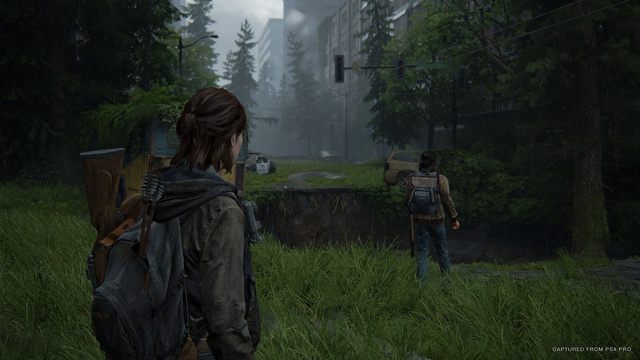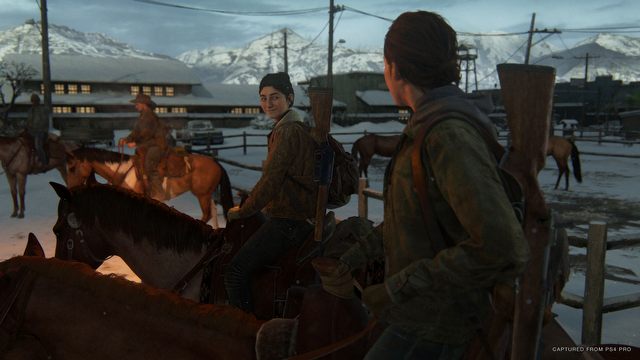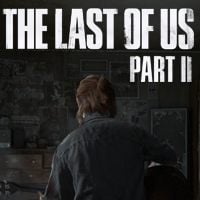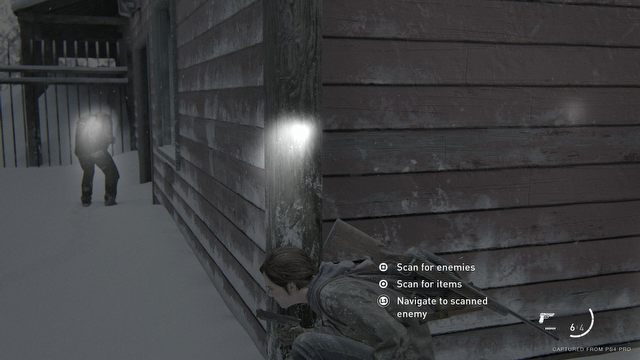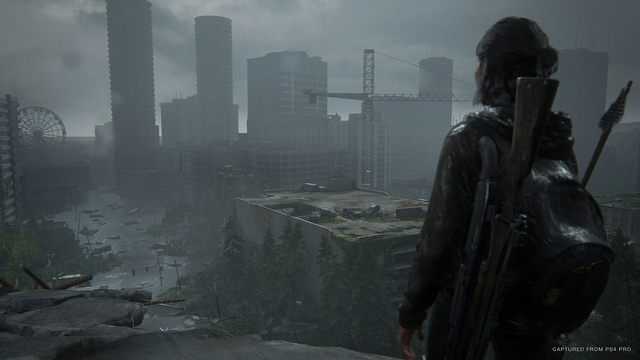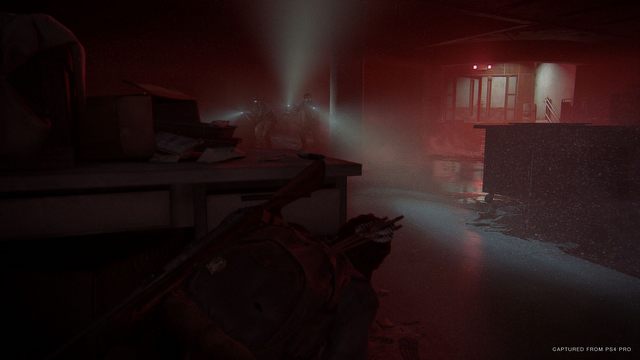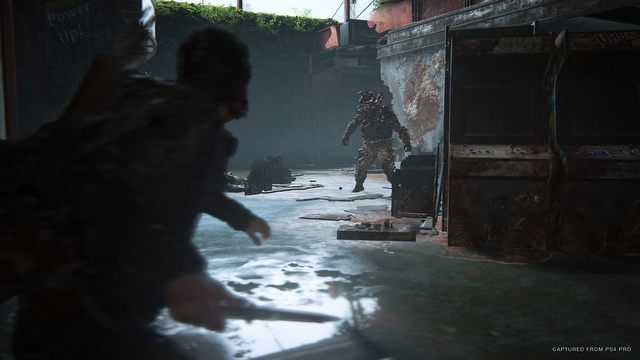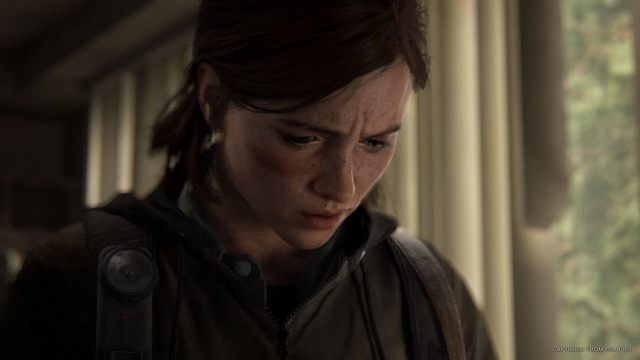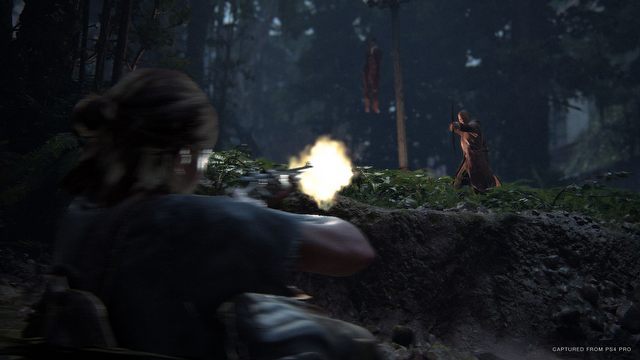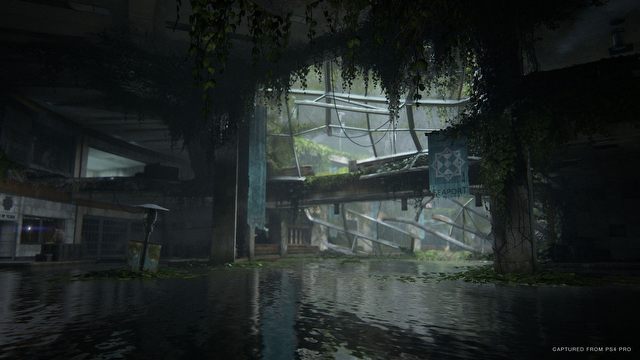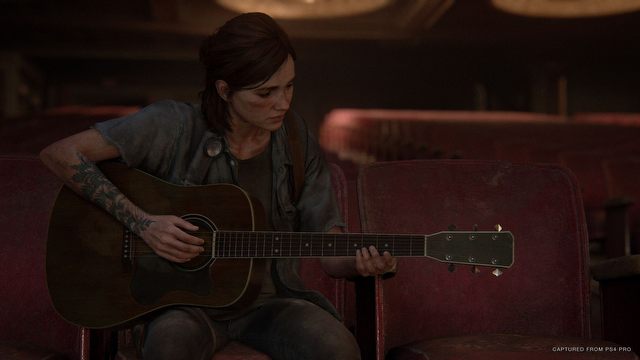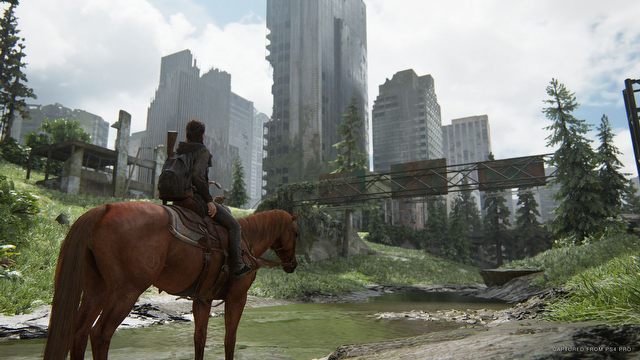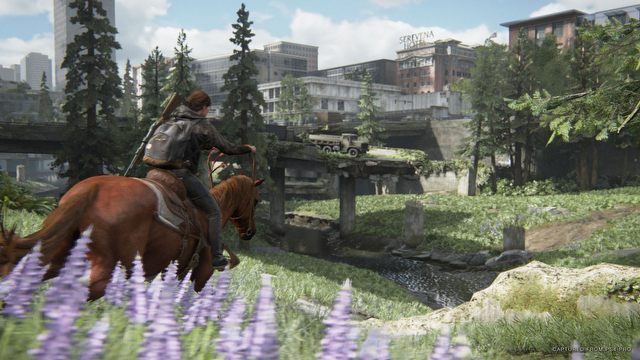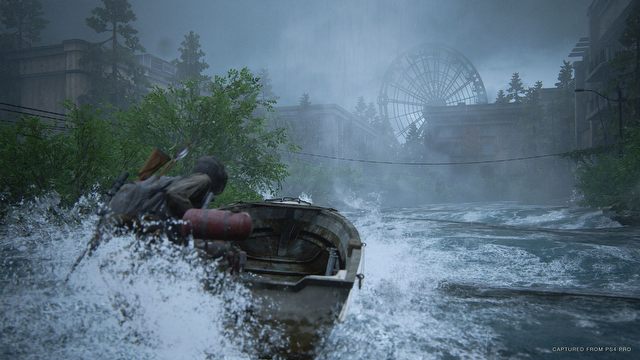The Last of Us 2 Review – A Game to Set the World on Fire
We awaited The Last of Us: Part II like salvation. And you know what? The 2020 game of the year title is going to be a duel between Cyberpunk 2077 and Naughty Dog's new opus magnum.
The review is based on the PS4 version.

- a long story worthy of the original, with many a plot twist;
- feels make you howl and revaluate your lives;
- interesting characters, masterfully performed;
- top-notch cut-scenes;
- graphics, but also scenography;
- music, although different, perfectly underlines the tone;
- exciting enemies, human and infected;
- extremely bold in tackling mature themes;
- the quality of every scene, every dialog is astonishing.
- longer, wider, deeper and bigger as a whole!
- enemy alertness system is a little too obvious
Imagine our world as an old barn. The dry hay laying inside is us – humans. The smudges and puddles of flammable oil are all our problems and differences that we've been arguing about (and killing for) since millennia; since time immortal.
The Last of Us Part II carelessly throws a torch inside. The fire will reach into the sky, and the blaze will be visible from afar for the entire night. It seems that for some people, what this game represents is the embodiment of evil, an arch-demon sowing chaos. There certainly are people, who will devote countless hours and nights to pronounce their concerns, spell out their rage. In countless posts, they will argue about politics, ideologies, Marxism, capitalism, liberty, and other such constructs.
All the while, they could just be having the time of their life in front of their hard-earned TV sets, refreshment in one hand, pad it the other, enjoying what's likely the best game that was ever conceived in the history of our sad, flammable world. A game that's certainly not perfect, and which certainly contains at least several events and conversations that we could have a great chat about. My God, Naughty Dog – you are going to set the world on fire in a week. You will clutch the hearts of millions of people, who have at least a pinch of empathy in them.
NO SPOILERS.
We're won't spoil anything in the review. It only outlines the beginning of the game, without revealing any vital events. I won't even reveal all the new gameplay solutions that are in the game. That's all. Now go buy the game.
Postcards from a sad, flammable world
Writing about games that you hold especially dear isn't easy. It's a bit like defending your own imagination, and there's obviously no point doing that. It's also a bit like trying to convince people to your point of view, and that's obviously not the point. That's why writing this text was a real ordeal for me. Meanwhile – if you'd think about it – the task is fairly simple: The Last of Us 2 delivers an experience to match the thrilling original, and this, in a way, is all we have to know. Everything, starting from the plot and emotions to graphics and animations, to gameplay, has been tweaked and received more depth. There's no revolution – or rather, it is taking place on a different level.
Before I have to indulge on checking the mandatory review elements off, let me just spare a word about the absolutely dazzling effect this game has had on me overall. The Last of Us 2 went through my life like a shockwave from a super volcano eruption. It leaves no stone unturned, and though I actually completed the game about three weeks ago, I still have a hard time fully enjoying any other production. Now it all seems flat, void of any sort spirit – uninspired, undirected, cobbled together; cheap. Launch Assassin's Creed Odyssey after completing TLoU2, and you'll get just what I mean. It's an aesthetic rasp that I can't shrug off, and it's impossible to enjoy either the characters, the story, or the dialogs in a game like that. Light years ahead, dude. That's how far Naughty Dog is right now. Last time I felt something similar was after experiencing Red Dead Redemption 2.
There's no revolution, because there was no need for one. I can imagine the genre and the legacy of the original curbs the creators here and there, which is arguably the game's biggest disadvantage – mechanically, it does feel like the same game, and if you've recently completed part one, you might feel somewhat of a dissonance. Of course, there are minor improvements in a few places, and it all looks and works well. But in terms of mechanics, it's rather straightforward.
The biggest novelty in terms of gameplay is a semi-open stage, similar to those from Uncharted 4 (also a game from ND) – we can explore it on horseback. There's plenty of side-activities there, some extra dialogs, and hidden collectibles, but it's the only such area in the entire game. The rest resembles the original – only that the stages are much larger, wider, and taller, with increased verticality. Exploration is fun, even if you've just got a few corridors.
Improvements, assistance and accessibility
Naughty Dog took considered the issue of facilitating access for people suffering from a variety of impairments. The production offers a new standard in these terms, and I do hope more developers will follow suit. The game obviously allows customizing options for color blindness, but there also is a narrator mode, and even audio prompts and acoustic location of items. You obviously have to navigate through some menus to enable these facilitations, but some people will find it a godsend. Kudos, Naughty Dog!
Child of wretched times
It's been five years since Ellie and Joel had their last conversation, near Jackson. Ellie is a grown woman now. Along the way, she lost the curiosity and optimism of a child – more often than not, she contemplated her inland empire and clearly enjoyed silence. Her mien became murkier, she got some tattoos (which are actually supposed to cover up bite marks). But we know that inside, underneath the stern mask of arid personality, hides a completely vulnerable soul, aching for love. Those few years of relative safety in Jackson partially allowed her to catch up with what coming of age means. There were new people in her life. Ellie starts entering relationships and looking for partners. Her friends, Dina and Jessie, are always around.
Joel works a lot – he and Tommy patrol the areas surrounding Jackson. It's not exactly idyllic, but it is far more secure here than in any other part of the country. Life seems to be taking its own course: children are born, people drink in pubs, there's a lot of work to get done. In the evenings: movies, parties or playing guitar. A small, civilized society taking shelter behind the high walls, trying to forget that the world outside has ended.
We presume this calm cannot last forever. And indeed, we soon set off through the devastated United States. The wintery backcountry of Jackson will be traded for a rainy Seattle, along the way getting caught in the middle of a conflict that doesn't really concern us. We'll have to chop our way through the zombies and the mad survivors. Your first instinct upon seeing something move better be getting a steady aim of the thing, rather than saying hello. Your cheeks will be sprinkled by the blood of the people trying to kill you as often as they're lashed by the rain. You'll gasp, scream, and agonize. You will take lives, not only in self-defense. If you loved the protagonist of the original, portrayed by Ashley Johnson, your head is gonna spin. The fate of Ellie – a girl raised during time of contempt – will move even a heart of stone.
I can't tell you what forces Ellie to go. I can tell you that the prologue is longer than expected, and even though it may feel like it's dragging on, it perfectly sets things up for the entire dram of part two. The protagonist feels a lot less harmless compared to Ellie from the latter stages of the original, when she and Joel got separated.
Now you see me, now you don't
Ellie's nimble and agile, she's fast – she's flying. She can swim, too (which is a must given the circumstances). The difference between Ellie now and six years ago is colossal, and it's great that it's so pronounced in the mechanics. She's strong, more than able to take on grown men. She's as capable as Joel, but way more flexible.
The protagonist is also better-suited to a stealthy approach, enhanced with a new posture – prone. We can quickly switch between different postures, hence improvising our way around the environment, hide underneath trucks or in tall grass (which looks awesome). While prone, we're also able to shoot and craft (the idea being, I assume, that it's possible to open your backpack while lying on the ground). Occasionally, we have to swing on a rope, leap over a precipice, swim across a rapid torrent, or jump over various obstacles. And that's basically it – the rest roughly corresponds to what you know from part one.
All right – there's also an elaborate mini-game. Joel taught Ellie how to play the guitar, and at certain points in the game we can actually play a few chords using the touchpad. It's a nice change from shooting zombies – and quite creative at the same time, because it kind of seems prone to improvisation. I'm already looking forward to Ellie playing the ABBA's Dancing Queen, or Last Christmas Wham!
But back to the point: we usually engage in combat from hiding, and the level design actually promotes stealth with conveniently placed hobjects (hiding-objects, just coined it) and crack which we can squeeze through. Open combat, though possible, is more challenging – ammo is scarce, and runners are able to brutally break our combos, which requires us to make more use of dodging. Ellie still carries her inseparable knife, and she makes good use of it (the blade doesn't break, so killing clickers is easier). When it comes to firearms and other weapons, we have the usual set: pistol, shotgun, revolver, bow (which now works a little differently), as well as the indispensable bricks and bottles. Ellie also learned how to make improvised silencers for guns from cans.
Decidedly inedible mushrooms
Combat, although not very different, is more brutal. Blood spills and splashes on walls, flames spread and engulf screaming people and animals, and headshots leave no doubts.
Combat with humans and the infected is clearly distinct. I've mentioned this in the preview – the stalkers are now much more formidable. While they didn't even pose a real threat in the original, they're now the meanest enemies, as they still have residual intelligence. Instead of attacking directly, they'll try to surround you. Our sixth sense does not detect them, players not accustomed to dealing with this kind of enemies, will probably manifest the proper way of reacting to a gnarly, repulsive, mushroom-people – namely fear.
Similar changes were made to the bloaters. The range of their skills is not extraordinary, except one detail: they can break through walls and smash other obstacles in their path – so it's impossible to hide from them behind seemingly solid covers. During the journey, Ellie also discovers a new adversary – the shambler. This lad is similar to a bloater, but not as powerful. The shamblers, however, are able to pour acid and are much more prevalent.
Clashes with the infected are super intense. When the show is over, you will feel relieved, a bit like getting out of a completely dark room. And by the way – the models of the infected is amazingly detailed. It's gross, but checking them out up-close lets you appreciate the quality of their design. Sounds nauseating? Because it is. Kudos!
Human opponents are also more interesting than they were in part one. In the original, we mostly fought various bandits who, like all bandits in bandit worlds, kept themselves busy with acts of wicked – but ultimately meaningless – banditry. This time, as I mentioned, we get stuck in the middle of a conflict between two sworn enemies – the military WLF (the so-called Wolves), and a radicalized sect straight from Ari Aster's Midsommar. Both groups genuinely hate each other, and they identify us as perhaps not completely understandable, but a threat nonetheless. For the first time, we will also have to deal with the most obvious of threats in a vile world like this – the hounds. Naughty Dog creates a game where petting dogs is just one of the possible interactions. Dogs introduce some additional tension – they're able to sniff you out from a distance, alerting the search party.
The other faction, the Scars, are a crazy (though rather formulaic) sect; purists, who defy using anything left behind by the old civilization. It is a strictly tribal faction – with rituals, a strict, radical creed, and keen on violence. The initial confrontations with them are impressive – the scars wear leather coats, often carrying torches, and they communicate with whistling.
Here, Naughty Dog have used another psychological gimmick – opponents react to the death of their comrades, and I don't mean raising the alarm. When we kill someone, they shout out their names, thereby remind us that we killed, well, a person, with their own story, identity, and path, and the end of which they met Ellie. Such a simple idea, yet how powerful!
The air grew denser
Perhaps I'm biased because I don't generally enjoy horror stories (I think stuff is pretty bleak as it is), but it felt like most of the game takes place in gloom; basements, vaults, sewers, and other musty, disheartening locations. These locations are usually favored by the infected, while the streets are mostly the domain of the warring human factions. So it generally got a little scarier – lest there be any understatement: it's still not a horror movie, but there are very sporadic jump scares, and the atmosphere raise the hair on your neck.
There are stages in this game that you complete with your breath held. Naughty Dog achieves some incredible feats it terms of creating a suggestive world. And they're not afraid to lie to you. You'll see sunshine after a dark stage, you will start letting your guard off, and a minute later, you're even deeper in mud, in even darker a corner of the world. The game plays with you like a cat with a dying mouse: how much more can you take? I loved it! These depressing moments were, however, dosed in the right amount, and they were never really tiresome, since each of these damn, stinky, gloomy stages brought a different setting, decor, interiors, and some fantastic level design, which doesn't seem capable of becoming boring!
It must really take a wicked imagination to come up with all those rotten rooms – my God, the things you can find! I know what you can't find, though – another game like this one. Forget Bethesda's copy-pasted locations – the houses, flats, hallways, basements and attics, shops and banks you visit in The Last of Us Part II will blow. Your. Mind. Really, the production design here deserves an Oscar.
It will be one of the most beautiful games for PlayStation 4. I don't know how my console managed to launch this miracle – the woods look real, the grass is a work of art, but Lord all mighty! Once you get the game, go ahead and run around the frozen streams around Jackson. Note the thin layer of ice that always forms on the banks of rivers and streams. It breaks and crunches just like in real life.
You can see the incredible amount of attention to the tiniest details in every destroyed, moldy, rotten, mushy, decaying and vile interior, which you will visit. And then, there's a certain beauty to it all. The nature, reclaiming the land and taking away from man what belonged to her displays all its might and roaring anger in Seattle. Rivers sweep the streets, tearing the asphalt and slowly but steadily rinsing the foundations, giving the city (and thus the levels) a nice dynamic.
I loved the cunning design, which manages to fool you – it's hard to get bored, and you won't be thinking "Oh, I've seen this refrigerator 300 times." You will see offices, which – a bit like our office now – remain in relatively undisturbed state ever since people left, still bearing evidence of their work. There's also a nice, trivial detail: the computers in the offices are unflattering, rather mundane. The gaming rigs we find in houses are real, PCMR, sick gaming computers (The Last of Us 2 on PC confirmed?!) And there's a billion such subtle tidbits and details – you'll find forgotten books patiently resting on the shelves in bookstores, sharply contrasting the gaping shelves of stores and pharmacies. You can also spot the cherished gaming console in some houses – PlayStation 3. Why not PS4? Because the epidemic broke out before it launched. Really nice. Very comforting, Naughty Dog...
Blood tears on the script
I promised I wouldn't talk about cut-scenes (of which there's a whole lot, and which all look like a million dollars – for a good reason), and about the characters, and events. There's only a few specifics I can share apart from my overall impressions and convictions, based on about thirty hours in the game. And there's not a lot to talk about here, either; I am thrilled, exhilarated.
Everything – from story decisions, to production, directing, design, and the gameplay – constitutes at least three dozen hours of a grand, beautiful, amazing adventure. There are some genuinely touching moments in the game, leaving you with jaw dropped, feeling lost – not because your jaw is on the floor, but because your soul has been touched. And it might as well be rubbing you the wrong way sometimes, spurring an introspective reflection. You will feel that way many times.
There's also moments when the tiniest muscles on Ellie's face will tell you more than the finest voice-acting would. Blood is thudding in your ears – or maybe it's just the deep soundtrack by Gustavo Santaolalla, the same composer that wrote the score for the original. This time, its way more ambient, consisting slow, pounding beats. It's dark and purple, reminiscent of Jóhann Jóhannsson's score to Sicario (especially the roaring, downtempo compositions like Beast, The Border, or Armoured Vehicle). So, Ellie just stands there, and we feel all the rage in her. All the hate building up. Stirred blood ready to burst out. This moment is arguably the single scene that proves how important a message the game carries.
You can even call me a fanboy, I don't care. But I am certain that if you've played the original and it left but the faintest trace in you, The Last of Us 2 will reignite this flame. And although somewhere along the way some of the intimacy characteristic of the first part was lost (we're still not saving the world, but the story touches many issues and interests), the postapo setting introduces a completely new level of seriousness and maturity.
The Last of Us Part II talks a lot about hate – it's a complex, terrifying and multi-layered study of anger, evil, trauma and PTSD. But it's also a story of love – the strange, transcendent propensity that appears in us somewhere during puberty and often stays with us until we die. Ellie is no exception – she falls in love and tries to care for her relationship in times of plague (and I'm the one referencing Marquez here, ok? Not Naughty Dog).
"I love you" sounds weird with blood on your hands. It's all the more difficult to feel safe in a relationship like this. And yet – the characters of The Last of Us 2 are not made of stone, they have genuine emotionality. And even though the world is already over, they're reluctant to follow it into oblivion – instead, they're trying to lead their lives, against any rationality. That's why they insist on starting families and not giving up – even at the cost of their safety. The narrative in The Last of Us 2 uses flashbacks, and most of them are small, emotion-packed works of art. That's all I can tell you.
Relax, it's almost over
The game has, or can have – depending on taste, approach and perception – certain drawbacks. For me, it truly is a complete experience, in which all elements, even if they could potentially be further optimized, work together to create a coherent, high-quality adventure. If you feel like nitpicking, there is some predictability, especially to players familiar with the original, to the way stuff generally happens – you can usually tell when the game is trying to kill you, and when it's preparing a cut-scene. Not all the textures in the game are exactly cutting-edge (which by no means is supposed to suggest the graphics are anything but excellent), and Ellie once happened to teleport through the door. Beyond that, I was irritated by the sound warning of adversaries detecting us, and PS4 Pro admittedly behaved like it wanted to take-off and join Elon's Starlink (oddly enough, the regular PS4 was mostly silent like a mouse). I also had a rather subjective and hard-to-prove impression that the game was too quiet.
Besides, the story is much more complex than in the original, and it may seem a bit too dense initially. And even then, all the cut-scenes, dialogs and little bits of the world remained completely riveting. Besides, it is precisely this that makes this single-player so repeatable. The second playthrough will let you see all the characters and their motivations differently – this alone makes the 20 hours in the New Game + worth it.
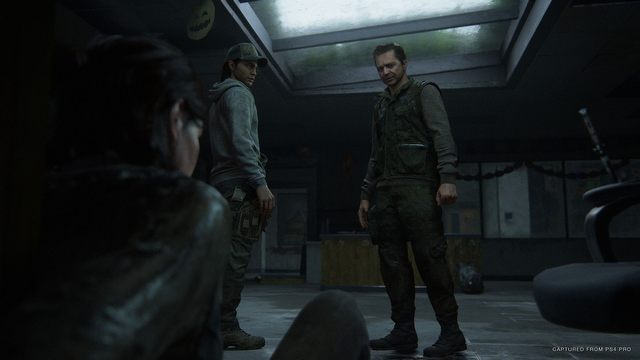
Many characters, many threads. Completing the game for the second time should be at least equally fun as the first time around.
Definitely the most beautiful end of the world
The Last of Us 2 is actually a great depiction of the year 2020. When at midnight on 1 January 2020, you were babbling wishes of happiness, to your friends, no one was expecting that life will soon be significantly reorganized. The new game from Naughty Dog – after delays and a number of rather unsettling reports from production – comes at a time, when we slowly attempt to leave our homes. Of course, compared to the game, we're getting away with it. But there sure is plenty in common.
This is the level of craftsmanship we've come to expect from Naughty Dog, and which they proudly deliver. . You see the score and you know that Ellie and Joel are coming back in a great, in many ways outstanding, sequel. For many of you, it may be perfect. What's also adding spice is that this is a sequel, and these are usually tricky.
On release day, you'll run into the store, forget your mask, and spit on the salesman in excitement. You will launch the game and discover that while The Last of Us 2 tells the story of a fictitious world, in which a pandemic decimated the population and reduced societies to tribalism – it also says a lot about ourselves. So you will snort, laugh, scream with anger and joy, give a stifled "wow" and act like, a little distracted, but sincerely happy child. And you'll constantly feel like you're witnessing something incredibly important.
There are threads in this game that I can't tell you about, and which will be very loud after the release. . The game is provocative in a good way. Naughty Dog don't hold back, there's no censorship and ambiguity – to the contrary, it tackles difficult themes without trivializing them. These are just gestures that matter – and if we want to, we'll look for more of them. The rescheduled release came just a month after many Americans – and the world in general – celebrated the anniversary of the events that began with the Stonewall Inn police raid in June 1969, prompting the LGBT community to start taking their voice. Perhaps it's a mere coincidence, and perhaps just a subtle gesture that cost nothing. Maybe some courage.
God save Naughty Dog and protect their spouses. It's not that often that games give us genuinely touching moments. I believe no one has set the world on fire as beautifully as the team from Santa Monica.
DISCLAIMER
I spent 35 hours with The Last of Us Part II, although the game could be completed in about 20+. I've completed the original several times, and it remains for me the benchmark of ambitious narrative.
The Last of Us: Part II
The Last of Us 2 Review – A Game to Set the World on Fire
We awaited The Last of Us: Part II like salvation. And you know what? The 2020 game of the year title is going to be a duel between Cyberpunk 2077 and Naughty Dog's new opus magnum.

